Whatever happened to Bafana Bafana’s 2002 World Cup squad?
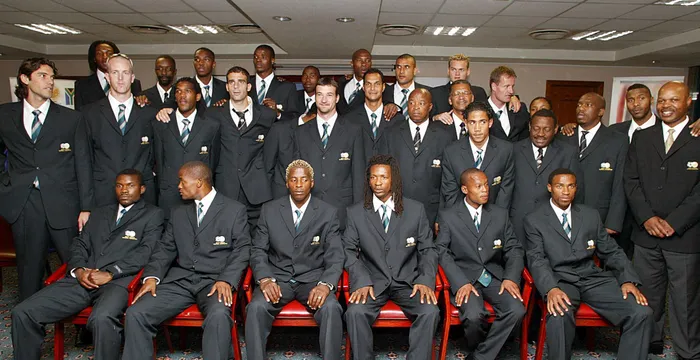
The Bafana Bafana players pose for a photograph as they prepare to depart for the 2002 World Cup in Korea and Japan. Matthew Booth, who is seen second from the left, was a late withdrawal after picking up an injury before the tournament kicked off. Photo: Yoav Lemmer/AFP
Image: Yoav Lemmer/AFP
Four years after making their historic debut at the 1998 World Cup in France, South Africa returned to football’s grandest stage – this time in Korea and Japan.
Led by the ever-reliable Lucas “Rhuu” Radebe and guided by caretaker coach Jomo Sono, Bafana Bafana’s Class of 2002 carried the weight of a nation that had come to expect progress from its golden generation.
Drawn into a tricky group alongside Spain, Paraguay, and Slovenia, the team showed flashes of real quality and resilience. Quinton Fortune’s cool penalty against Paraguay and Siyabonga Nomvethe’s winner against Slovenia remain iconic moments in South African football history.
Although Bafana Bafana fell agonisingly short of reaching the knockout stages – eliminated on goal difference – the campaign symbolised a transition between eras as the veterans of 1996–98 passes on the baton to a new wave of stars.
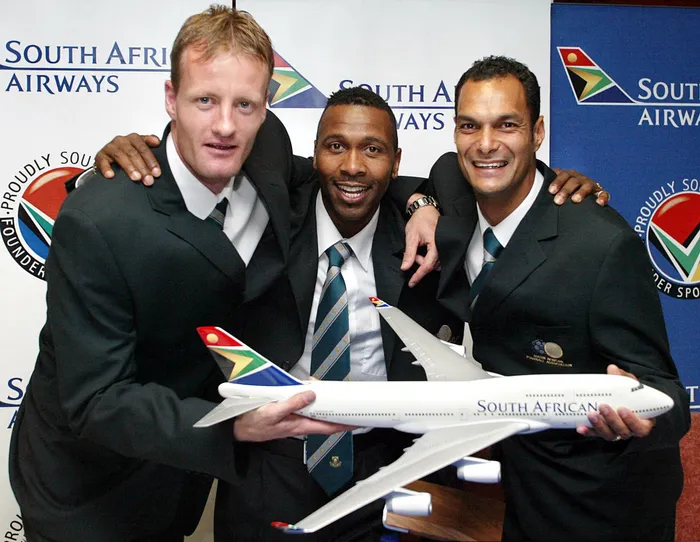
Goalkeepers Hans Vonk and Andre Arendse, along with skipper Lucas Radebe prepare to depart for the 2002 World Cup in Korea and Japan. Photo: Yoav Lemmer/AFP
Image: Yoav Lemmer/AFP
The squad was a fascinating mix of old and new – Radebe, Andre Arendse, and Thabo Mngomeni provided leadership and experience; while future stalwarts like Steven Pienaar, Aaron Mokoena, and Benni McCarthy embodied South Africa’s next generation of talent.
With South Africa returning to the global stage in North America next year, we take a look at what happened to the stars of 2002.
Hans Vonk (Goalkeeper, 32 years old)
By the time the 2002 World Cup rolled up, South African fans had been acquainted with the Heerenveen goalkeeper who had won 29 caps. Despite being the first choice leading up to the competition, Vonk lost his place to Andre Arendse at the World Cup. After the tournament, he would play another 14 times, and would retire from international football after Bafana Bafana failed to qualify for the 2006 World Cup in Germany. At club level, he spent four years at Ajax Cape Town – in two stints – with a year each at Ajax Amsterdam and Heerenveen in between. After retiring in 2011, he briefly returned to the Netherlands to work in football administration. He’s now currently living in Cape Town where he runs a travel agency.
André Arendse (Goalkeeper, 34 years old)
Bafana Bafana’s first choice at the 1996 Africa Cup of Nations missed out on the 1998 World Cup due to injury, but won his spot back in 2002, featuring in all three of Bafana Bafana’s games in Korea and Japan. In 2004, he retired from international football, but continued at club level. He finally hung up his boots in 2009, but briefly came out of retirement in 2013 when Bidvest Wits had an injury crisis with their goalkeeper. The two games he played at the age of 45 made him the oldest player in PSL history. After retiring, Arendse spent many years as a television analyst, and as SuperSport United’s goalkeeper coach, and left that role at the end of the 2024/25 season.
Calvin Marlin (Goalkeeper, 26 years old)
The then Ajax Cape Town goalkeeper was selected for the World Cup ahead of Kaizer Chiefs’ Brian Baloyi. Unfortunately, he spent the tournament on the bench as head coach Jomo Sono preferred the more experienced Arendse between the sticks. Marlin would earn his time in the sun when he was the team’s first choice at the 2006 Africa Cup of Nations. Up until October 2023, Marlin was the goalkeeper for Cape Town Spurs. Since last month, he’s been the Sales Consultant for Jojo Tanks in his hometown of Gqeberha.
Lucas Radebe (Defender, captain, 33 years old)
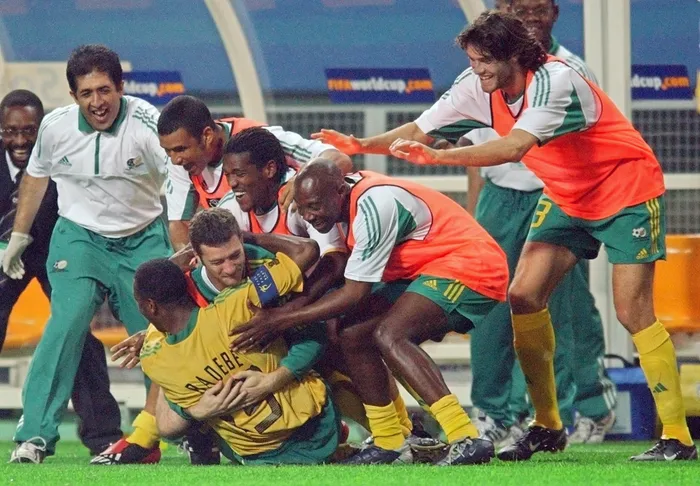
Skipper Lucas Radebe celebrates with teammates after scoring their second goal during their game against Spain at the 2002 World Cup in Korea and Japan. Spain ended up winning 3-2. Photo: Christophe Simon/AFP
Image: Christophe Simon/AFP
For the second tournament in a row, Lucas “Rhuu” Radebe was the team’s captain. In the twilight years of his career, Radebe had seen it all, and was the perfect man to lead the team in Korea and Japan. After the 2002 World Cup, the Leeds United legend would play just once more for Bafana Bafana. He eventually retired from all football in 2005. In the following years, he was influential in South Africa's successful bid to host the 2010 World Cup. Since retiring, Radebe has remained very busy. He has worked with charities and social initiatives, including the Starfish charity and was a FIFA ambassador for SOS Children's Villages. Recently, he was appointed to the role of official club ambassador by Leeds United.
Cyril Nzama (Defender, 27 years old)
The Kaizer Chiefs captain was one of the most influential players in South Africa at the time, so it’s no surprise he was a key player for the national team. He featured in all three games at the World Cup. Nzama, who was famous for shunning the spotlight, ended up winning 44 caps for the national team, and called time on his career in 2011, playing for NFD side Batau FC. According to reports, Nzama was last year working as a youth coach and mentor for the Coach Time programme.
Bradley Carnell (Defender, 25 years old)
The former Kaizer Chiefs man was a regular for Bundesliga side Stuttgart during the World Cup, and was part of a settled back four alongside skipper Lucas Radebe, Cyril Nzama, and Aaron Mokoena, playing in all three games. After 12 years in Germany, he returned to South Africa in 2010, signing for SuperSport United and playing for just one season. After retiring, he began his journey as a coach, starting at the University of Johannesburg. In 2017, he moved to the United States, becoming assistant coach of New York Red Bulls. Since the beginning of 2025, he’s been the head coach of Philadelphia Union in Major League Soccer, and has recently guided the team to the Supporters’ Cup.
Aaron Mokoena (Defender, 21 years old)
The first – and only – player to reach 100 caps for the national team, Mbazo was just a fresh-faced 22-year-old in 2002. Despite being so young, he had already played himself into one of the key defensive players, and much was expected from him. After that year’s World Cup, he would cement his place in defense, and would eventually be appointed as captain in 2008, a role he would hold on to until the 2010 World Cup, hosted in South Africa. After spending some time as Cape Town City’s assistant coach, Mokoena is now a SAFA scout and SABC television pundit. He is also the founder of the Aaron Mokoena Sport Academy.
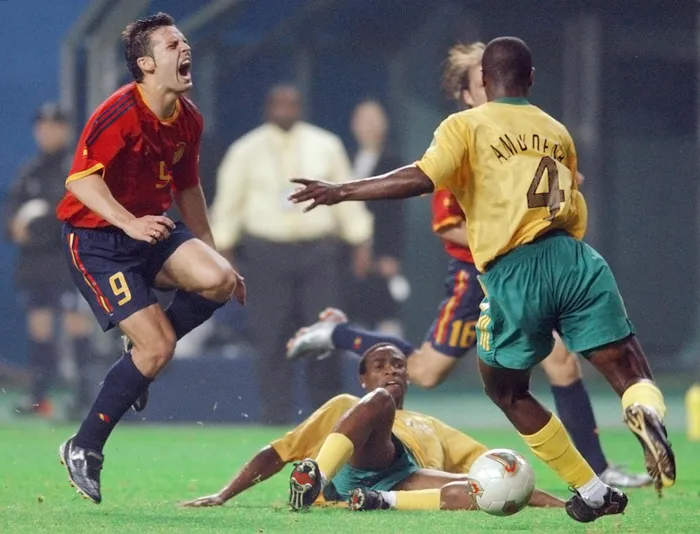
Teboho Mokoena tackles Fernando Morientes while Aaron Mokoena picks up the loose ball during Bafana Bafana's 2002 World Cup clash against Spain. Photo: Christophe Simon/AfP
Image: Christophe Simon/AfP
Jacob Lekgetho (Defender, 28 years old)
The 28-year-old Lekgetho was called up late after Matthew Booth was withdrawn due to injury. As a result, he only saw limited action at the World Cup. At the time, Lekgetho was a key performer for Russian club Lokomotiv Moscow, and featured regularly in the UEFA Champions League. He left the club in 2005 citing family reasons, and died in hospital after a battle with illness in 2008. He was 34.
Pierre Issa (Defender, 26 years old)
Pierre Issa started all three of South Africa’s games at the 1998 World Cup in France, but played just once in 2002 after picking up an injury 26 minutes into Bafana’s first game against Paraguay. Issa, who became infamous after scoring an own goal in Bafana’s France 1998 opener against the hosts, played for the national team for four more years, going on to earn 47 caps. After retiring, he served in various capacities, including as sporting director for Green giants Olympiacos. According to an IOL report from two years ago, Issa runs Playeleven11, a company that develops football talent with a specific focus on Africa and France.
Thabang Molefe (Defender, 23 years old)
Thabang Molefe’s Bafana Bafana career was brief. At the 2002 World Cup, he featured for 10 minutes as he came on as an 80th minute substitute for Lucas Radebe in South Africa’s third game of the tournament, played against Spain. Molefe is most famous for what happened the following year, though. In a friendly match against England in Durban, Molefe, who was then a part-time footballer, fractured the hand of then Manchester United star David Beckham. Last year, Molefe claimed he was a driver for Avis Car Rental, a job he’s been in since he retired from football in 2006.
MacBeth Sibaya (Midfielder, 24 years old)
Durban-born MacBeth Sibaya was one of a number of players who had at one time worn the Jomo Cosmos jersey selected by Jomo Sono. Prior to the World Cup, he had played just nine times for the national team. But, he was clearly on the rise. At the World Cup, he featured for the full 90 minutes in all three games as he formed a solid partnership with Teboho Mokoena. In the years following the 2002 tournament, he remained an important player, and would go on to earn 62 caps in total. He was also a part of the Bafana squad at the 2010 World Cup, and played the full 90 minutes in their 2-1 win over France. At club level, he had a distinguished career, spending seven years playing for Rubin Kazan in Russia. There, he won two league titles, and even played in the UEFA Champions League. Since retiring, Sibaya has remained within the game. He started his coaching career at SuperSport United, where he worked with the reserves. After that, he was one of the key figures at KZN Academy. Sibaya was most recently attached to Durban City. Outside of football, Sibaya and his wife run their own farm in KwaZulu-Natal.
Quinton Fortune (Midfielder, 25 years old)
At the 1998 World Cup in France, Fortune was a youngster who was making a name for himself at Atletico Madrid. By 2002, he was a seasoned campaigner who was playing alongside the likes of Roy Keane, David Beckham and Ryan Giggs at Manchester United. Like the previous World Cup, Fortune started all three of South Africa’s games in Korea and Japan. His biggest impact came in their opening match against Paraguay where he converted a late stoppage time penalty to earn South Africa a 2-2 draw. Since retiring, Fortune embarked on a coaching career that’s saw him back at Old Trafford. This season, he has been the assistant coach of La Liga side Real Oviedo.
Thabo Mngomeni (Midfielder, 32 years old)
Although he didn’t play a single minute at Korea and Japan, the dreadlocked Mngomeni was one of the most pleasing footballers to watch. He was brilliant technique, creative, and cool under pressure. He was one of those footballers who gave their teammates and supporters in the stands a lot of confidence when he had the ball at his feet. However, in 2002, younger players were starting to come up, and Mngomeni was on his way out. A serious knee injury ended his career at just 33 years old. Since retiring, he’s launched the Thabo Mngomeni Foundation, and works with.
MacDonald Mukansi (Midfielder, 27 years old)
The Lokomotiv Sofia winger was nicknamed “Scooter” for his speed out wide. He went to the World Cup with seven caps, but his appearance off the bench in the opener against Paraguay would be his last for the national team. After the World Cup, he bounced around a number of clubs in South Africa, Bulgaria, Cyprus, Russia, Greece, and India before calling time on his career at Bay United in Gqeberha. After retiring, he founded the Mukansi Sports Academy.
Bennett Mnguni (Midfielder, 28 years old)
Mnguni was another well-travelled player in the Bafana Bafana squad at the World Cup. At the time, he was attached to Lokomotiv Moscow alongside Jacob Lekgetho. Mnguni was a tough, industrious midfielder known for his tenacity, stamina, and defensive work rate. While he wasn’t the most flamboyant or technically gifted player, he was highly valued for his discipline, physical presence, and tactical awareness. Unfortunately, he didn’t play a single minute at the tournament. He would play the last of his 12 games for the national team in 2004. After retiring, he launched the Bennett Mnguni Soccer Academy.
Jabu Mahlangu (Midfielder, 21 years old)
Ngwana wa Tshwenya was one of the most talented players South Africa has ever produced. He could do it all. He was an exceptional dribbler, he was creative, he had vision, a brilliant change of speed, and was cool in front of goal. Unfortunately, he never reached his peak due to some issues off the field. His only minutes at the World Cup came towards the end of their game against Slovenia. After starting his career at Kaizer Chiefs, he went abroad to play for clubs in Austria and Sweden. However, the majority of his career was in South Africa. Jabu Mahlanguis now a soccer analyst for SABC Sport and has a podcast called Shuffling Diski Ringas. He also does motivational talks, giving advice to young players about the pitfalls of professional football.
Teboho Mokoena (Midfielder, 27 years old)
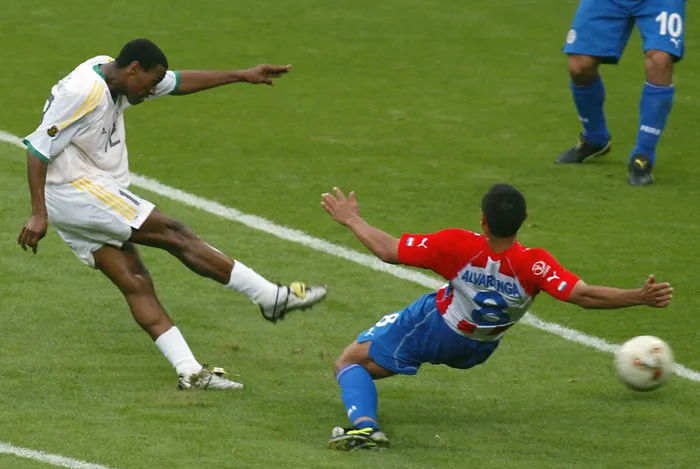
Teboho Mokoena shoots and scores during Bafana Bafana's 2002 World Cup opener against Paraguay. Photo: Greg Wood/AFP
Image: Greg Wood/AFP
One of the players in the squad was 27-year-old Teboho Mokoena, a former Jomo Cosmos star who at the time was playing for Swiss club FC St Gallen. And much like today’s Mokoena, he was a deeper lying playmaker with an eye for goal. In Bafana’s opening game of the tournament against Paraguay, the South Americans raced to a 2-0 lead through Bayern Munich’s Roque Santa Cruz and right back Francisco Arce. When South Africa needed a hero, Mokoena stepped up and fired the ball into the net from the edge of the 18-yard area. Bafana Bafana would grab a deserved point when Manchester United’s Quinton Fortune converted a stoppage time penalty to make it 2-2. He also played the full 90 minutes against Slovenia and Spain. After retiring, Mokoena founded the Teboho Mokoena Sports and Development Foundation in Ekurhuleni, working with young players in the East Rand.
Sibusiso Zuma (Midfielder, 26 years old)
Going into the 2002 World Cup, Sibusiso Zuma was two years into his career with FC Copenhagen. His form for the club the previous year saw him placed 29th for the 2001 FIFA World Player of the Year, which was won by Real Madrid’s Luis Figo. In Zuma, South Africa had one of the world’s best players in their ranks. Because of this, he played in all three of Bafana’s games. After the tournament, Zuma went on to become a legend in Danish football, and has a statue erected in his honour in Copenhagen. In 2005, he was sold to German Bundesliga club Armenia Bielefeld. After a brief stint in the PSL – playing for Sundowns and SuperSport United – and a short return to Denmark, he retired in 2015. After retiring, he opened the Sibusiso Zuma Foundation which works with young children with HIV.
Delron Buckley (Midfielder, 24 years old)
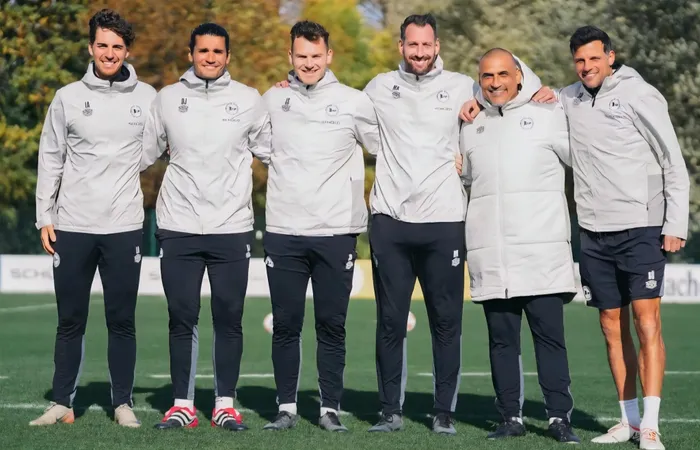
Delron Buckley, second from the right, has been learning the ropes as a coach at former club Arminia Bielefeld. Photo: King Ftbllife/Facebook
Image: King Ftbllife/Facebook
Bafana Bafana’s youngest player at the 1998 World Cup, Buckley had a little bit more experience in 2002 and was still at VfL Bochum. However, he was still making a name for himself with the national team and had not yet become a regular starter. In Korea and Japan, Buckley appeared in just one game, where he came off the bench as South Africa beat Slovenia 1-0. After the World Cup, he would cement his place in the team, and would go on to earn 73 caps in total. At club level, he would go on to play for clubs like Armenia Bielefeld and Borussia Dortmund. He called time on his career in 2014 after a two year spell in the PSL with Maritzburg United. After retiring, he worked on his coaching badges, and earlier this week, he returned to Armenia Bielefeld for a coaching internship.
Steven Pienaar (Midfielder, 20 years old)
At just 20, Pienaar was the youngest player in the squad in 2002, and as a result, he didn’t see a minute of action. The experience served him well as in 2010, he had become one of South Africa’s key players. Pienaar was at Ajax Amsterdam at the time, playing alongside the likes of Zlatan Ibrahimovic and Rafael van der Vaart. After two years playing for Borussia Dortmund, he moved to the Premier League with Everton, where he would become one of the world’s most well-known footballers. He ended his career in 2018, playing for Bidvest Wits, and has slowly been building up his coaching resume. After working for the Ajax academy between 2020 and 2024, he became a youth team coach at Emirati club Sharjah FC last year.
Siyabonga Nomvethe (Forward, 24 years old)
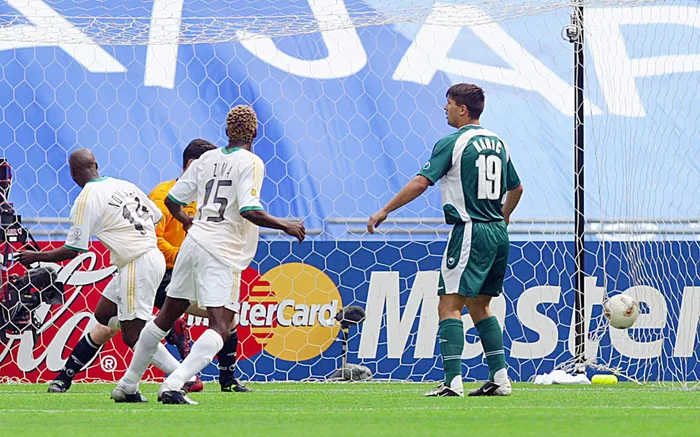
Siyabonga Nomvethe begins to celebrate after scoring South Africa's winning goal during their match against Slovenia at the 2002 World Cup. Photo: Pornchai Kittiwongsakul/AFP
Image: Pornchai Kittiwongsakul/AFP
Bhele Nomvethe had 30 caps to his name going into the World Cup, and was one of Bafana’s key attackers. He missed the first game against Paraguay, but was back in the team against Slovenia. In the fourth minute, Nomvethe put the ball in the net with his thigh, and South Africa would hold on to seal a historic first World Cup win. Nomvethe would continue being one of South Africa’s best players, and would go on to play at the 2010 World Cup, coming on as a late second half substitute in the win against France. He would go on to earn a total of 81 caps. He played his last game for the national team in 2012, but continued his club career well into his 40s. He would go on to become the PSL’s leading goalscorer of all time, and would hold on to that record until September of 2025. He would later go into coaching, and would spend a number of years as AmaZulu’s assistant coach, a role he would leave in 2023. He is currently a brand embassador for Trellidor, and is focused on youth development programmes like the Trellidor iKas’la Makasi Cup.
Benni McCarthy (Forward, 24 years old)
McCarthy was one of the best African players going into the World Cup, so he was a marked man. In France 98, McCarthy made history by scoring South Africa’s first ever World Cup goal. While the opposition were able to keep him quiet in the first two games, he would find the net in their last game against Spain. The Spaniards would go on to win 3-2, knocking South Africa out of the tournament. After the tournement, he would go from strength to strength and become an icon in South African football. In 2004, McCarthy would go on to become the first – and so far only – South African to win a Champions League medal. He retired as Bafana’s all-time top goalscorer, and remains so to this day. Since hanging up his boots, McCarthy has stayed in the game. In 2017, he was appointed to his first head coach job by Cape Town City. Three years later, he guided AmaZulu to CAF Champions League qualification for the first-time ever. In 2022, McCarthy was appointed as a member of Erik ten Hag’s backroom staff at Premier League giants Manchester United. In March of 2025, he was named as the head coach of the Kenya national team.
George Koumantarakis (Forward, 28 years old)
Athens-born Koumantarakis was one of the PSL’s most prolific strikers, and played a key role in helping Manning Rangers win the inaugural Premiership title during the 1996/97 season. Unfortunately, his time with the national team coincided with the rise of Benni McCarthy and Shaun Bartlett, meaning he featured just 13 times for Bafana Bafana. At the 2002 World Cup, he came off the bench as a late substitute in all three games. After retiring from football, Koumantarakis earned a law degree from the University of KwaZulu-Natal. He is now an accomplished businessman, developer and investor, and serves as a director for Logan Golf in New Zealand.
IOL Sport
Related Topics: